Conference explores 'Indigenizing' social work
Chief Allan (Chicky) Polchies recently adopted a two-year-old boy with his partner in St. Mary's First Nation. To him, that's one way to give an Indigenous child a voice and a stable home.
"If I can make a difference in one single Indigenous youth, then my job is complete," he said.
The responsibility he feels to make his son feel at home is just as heavy as the duty that falls on the shoulders of the social workers and social work students gathered for the Mi'kmaq Wolastoqiyik Association of Social Workers conference, he said.
It's their job to find ways to help Indigenous youth survive trauma and lead healthy lives.
"Every child matters, I know we hear this over and over again, but every child matters," he said at the opening of the second annual conference in Fredericton.

The conference is exploring ways to Indigenize social work.
Organizer and executive director Sandra Germain said Indigenization means looking at social work from the perspective of being Indigenous and with the historical and cultural knowledge that comes with that.
It means considering the life experience of Indigenous people, especially those who have been through trauma, when deciding what steps social workers need to take.
"[It's] more about caring and helping parents," she said.
"How do we help those parents become those parents they have to be for their children instead of just taking the children and ... abandoning the parents who are already traumatized themselves?"
That means "we've got a lot of work to do," she said.
According to a Mi'gmaq Child and Family Services of New Brunswick, 28 per cent of children in care of the province are Indigenous, while just 1.3 per cent of the population is Indigenous.
The keynote speaker on Thursday was Raven Sinclair, a professor of social work and a researcher with the University of Regina. Sinclair studies intergenerational trauma and family violence and the effects of residential schools and the Sixties Scoop on parents and their children.
Germain said that considering this trauma while practising social work in New Brunswick comes with challenges. She said First Nation social workers are available and working in the field, but they're practising a "mainstream" type of social work dictated by provincial legislation.
I'm confident with the schooling I received and weary in am I able to fully, 100 per cent put that foot forward in Indigenizing social work? - Shelley Augustine, social work student
The conference includes talks from two legal experts, Heather MacNeil, a legal adviser in Millbrook, N.S., and Tracey O'Donnell, a lawyer and member of Red Rock Indian Band in Ontario.
They will be discussing legal avenues to practise social work either in an autonomous way, or "delegative" way, where the province would allow First Nations to work independently.
"It's to take back social work we've done in the past," Germain said.
Feeling encouraged
The conference includes about 25 students from the St. Thomas University bachelor of social work program focusing on Indigenous youth. They filed into the conference room in a line, led by elders drumming and singing.
Student Shelley Augustine from Elsipogtog helped organize the conference.

She's in the final stages of her studies and said she's feeling "a little confident and yet a bit weary" as she goes into the field with a focus on Indigenizing social work.
"It's just a brand new concept and [you've] got to start at the grassroots and expand it."
But Austine said she's glad to be at the forefront of the effort.
"I feel excited and encouraged and supported and just ready to take it on," she said.

